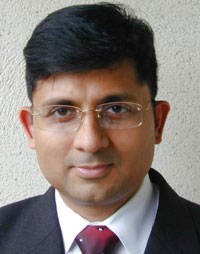For more archives, go to the Advance Archive/Search Page.
New Doctor Skills In
Reconstructive, Cosmetic Surgery
For someone who joined the faculty less than a year ago, plastic and reconstructive surgeon Dr. Rajiv Chandawarkar seems very at home at the Health Center.
Maybe that's because, though new to the faculty he is not new to the Health Center; he has spent most of his vacation time for the past several years working on innovative techniques for tissue repair in the Center for Immunotherapy of Cancer and Infectious Diseases. It could also be attributed to Chandawarkar's affable personality and obvious talent. Either way, he has quickly become a great asset to the Health Center.
 |
Dr. Rajiv Chandawarkar |
Chandawarkar has completed a fellowship in reconstructive surgery, and is also a fully trained cosmetic surgeon. He divides his time between cancer reconstructive surgeries, helping patients after procedures such as mastectomies or head and neck surgeries, and cosmetic plastic surgery, offering patients a complete array of procedures including tummy tucks, breast augmentations, face lifts, and more.
He also spends one day a week in the Center for Immunotherapy, managing his ongoing research projects.
"Dr. Chandawarkar combines a deep love and zest for surgery with an equally deep curiosity about fundamental biological questions," says Pramod Srivastava, director of the Center for Immunotherapy of Cancer and Infectious Diseases. "A very well trained person of exceptional ability, absolutely immense energy, and a heart of gold, he is a true trail blazer."
Chandawarkar, who grew up in India, knew from an early age that he was interested in medicine, and ultimately, surgery. After graduating from the University of Bombay, he completed post-graduate training in surgery and surgical oncology in India. During his fellowship in surgical oncology, he learned how to perform reconstructi ve surgeries. This was also the case during his second fellowship in surgical oncology at Kurume University in Japan, where he was struck by the importance of art in reconstructive surgery.
"The Japanese surgeons took great care to incorporate art into the science of surgery - it was a wonderful blend," Chandawarkar says.
The experience had an enormous impact on the course of his career. "It made me realize that the aesthetic component of reconstructive surgery was often lacking," he says.
After leaving Japan, he held a fellowship at the prestigious Sloan-Kettering Cancer Center in New York City.
The Path to UConn
Although he didn't know it at the time, New York was the first stop on his path to the UConn Health Center. While
at Sloan-Kettering, Chandawarkar befriended Srivastava, who was then pioneering an innovative, immunological approach
to fighting cancer cells.
Chandawarkar returned to India to practice surgery after completing the fellowship at Sloan. His years in New York, however, had changed his attitude toward clinical medicine. "Academic research and clinical medicine need to work together, and that was impossible in India where resources for science are scarce," he says.
And so Chandawarkar returned to the United States, even though he had to repeat all his post-graduate training in order to practice medicine here.
Before he started his surgical residency at Akron General Medical Center in Ohio, Chandawarkar immersed himself in science, working long hours in Srivastava's lab and developing 17 patents related to tissue repair.
Once he started his residency, Chandawarkar typically spent two weeks of his vacation time in Srivastava's lab. "As an example of his energy and the depth of his commitment to surgery and to science, Dr. Chandawarkar built a research laboratory from scratch, mentored a graduate student, and published academic papers from that work, while doing a successful surgical residency," Srivastava says. "He is the only person I know who had the will to do something like that and the energy to pull it off."
Chandawarkar continued collaborating with Srivastava in 2002 when he started fellowship training in microvascular surgery at M.D. Anderson Cancer Center in Houston, Texas.
By 2003, he was ready to establish a reconstructive plastic surgery practice. The Health Center was a natural choice.
Srivastava and his colleagues weren't the only people Chandawarkar already knew at the campus in Farmington. His friend Dr. Wayne Frederick, a surgical oncologist who also completed fellowship training at M.D. Anderson Cancer Center, joined the Health Center faculty in the summer of 2003. And Chandawarkar had established a rapport with Dr. Peter Deckers, the Health Center's executive vice president for health affairs who is also a surgical oncologist.
"Dr. Chandawarkar has exceptional skills, intelligence, and training, and a real commitment to academic medicine and surgery," Deckers says. "He is a tremendous role model for our students and residents."

